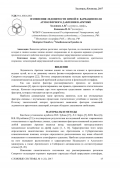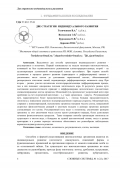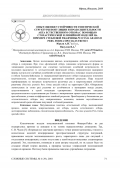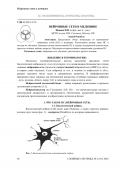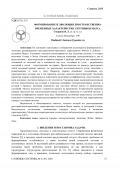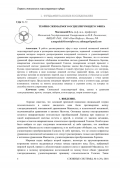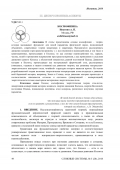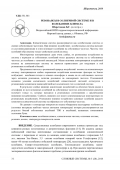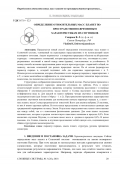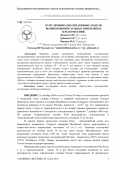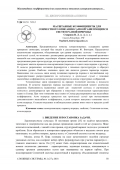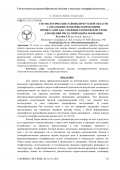Выявлены районы различных секторов Арктики, на изменения ледовитости которых в зимние месяцы значимо влияют опережающие их по времени вариации суммарной продолжительности действия некоторых элементарных циркуляционных механизмов.
Выделяются два способа организации индивидуального развития - регуляционное и мозаичное. Первый основывается на модели эволюции многоклеточности, возникшей на базе палинтомического размножения клетки-прародительницы, второй – на целлюляризации усложненной многоядерной клетки простейшего. При первом способе усложнение в процессе раннего развития (приводящего к дифференцировке) связано с увеличением числа клеток до достижения «критической массы», обеспечивающей разнородность клеточных связей, порождающую дифференциальную активность ядер. При втором – разные участки цитоплазмы клетки-прародительницы дифференцированы прежде, чем в них попадают однородные потомки зиготического ядра. В результате разные пути достижения многоклеточности приводят к дифференцировке цитологически гомологичных специализированных клеток организма. Мозаичный путь предполагает укороченный митоз при дроблении за счет отсроченной цитотомии – τо у таких организмов – минуты. Регуляционный путь характеризуется более продолжительным τо - отсюда большая продолжительность онтогенеза с появлением заметного пострепродуктивного периода (старость). Мозаичный путь сопряжен с миниатюризацией, исполнением организма меньшим числом клеток, повышенной скоростью физиологических реакций и заметным вкладом в размеры организма размеров составляющих его клеток. Регуляционный путь ведет к гигантизму, увеличению размеров организма за счет увеличения числа клеток одного размерного порядка, более длительным течением физиологических процессов. Такие полярные способы организации онтогенеза не существуют в чистом виде, а базируясь на единой цитологической основе, могут в разных пропорциях и в разные периоды онтогенеза обеспечивать все разнообразие наблюдаемых вариантов индивидуального развития.
Целью исследования явилось моделирование действия естественного отбора в популяции. При этом «физический отбор» (снижение встречаемости формы до элиминации) рассматривается как следствие хаотических колебаний встречаемости. В последних выделяется: 1) «стохастический физический отбор», (периодическое вымирание формы в результате случайных колебаний) которое описывается с помощью модели рождения и гибели Гудмена-Бейловски; 2) «направленный физического отбор» (градуальное изменение встречаемости), которое описывается уравнением линейной регрессии. Пара моделей верифицирована на материале встречаемости различных рас в макропопуляции стеблевой ржавчины (Puccinia graminis Pers. forma specialis tritici) на территории США. Обнаружены значительные (в сотни раз) различия по устойчивости к вымиранию между расами, существовавшими в одной популяции одновременно. Математические ожидания продолжительности существования рас близки к эмпирическим срокам существования только при небольших угловых коэффициентах линейной регрессии. Преобладание у большинства рас «стохастического отбора» над «направленным» возможно, вызвано неустойчивостью антропогенной среды обитания популяций стеблевой ржавчины.
Представлен обзор литературы по применению нейронных сетей (НС) в медицине. Рассмотрены разные типы НС и методы их обучения. Описаны случаи использования НС в задачах медицинской диагностики, прогноза лечения, выбора лекарств. Обсуждаются перспективные направления в развитии НС.
На основании структурных соображений анализируется формирование и эволюция (развёртывание) пространственно-временных характеристик Фобоса и Деймоса – спутников Марса. Указанные элементы рассматриваются как отдельная система, в которую включены Солнце и Земля. Основой анализа является концепция самоорганизации и два её представления – протоструктура и параметр порядка. Структура трактуется как совокупность отношений на числовой оси и понимается как сеть, состоящая из узлов – разрешенных состояний и связей – сопутствующих им правил. Протоструктура, по замыслу, представляет собой исходный вариант порядка; это циклическая последовательность узлов, способная к развёртыванию от этапа к этапу. Параметр порядка объединяет подчинённые ему характеристики, которые, как и сам параметр, исходно задаются протоструктурой. Эволюция параметра порядка сопровождается появлением масштабных коэффициентов, ответственных за связь основных участников процесса и их сателлитов. Указанная выше анализируемая реальная система представляется как сложная и лишенная специфики самоорганизующаяся система, в которой в процессе эволюции появляются два сателлита вблизи одного из разрешенных состояний. Модель излагается с переносом акцента на приложение. В приложении параметр порядка трактуется как относительный момент количества движения в Солнечной системе, а указанные коэффициенты играют роль масс. Выявляются устойчивые виртуальные состояний (начальное и конечное), которые рассматриваются как набор точек отсчёта для характеристики текущего состояния системы.
Выдвигается и обосновывается гипотеза, согласно которой все рассматриваемые пространственно-временные характеристики спутников Марса зависят от выгорания Солнца. Предлагаются соотношения, связывающие текущую массу Солнца и названные характеристики. Модельные характеристики соответствует наблюдательным данным в среднем в пределах 0,07%.
В работе рассматривается эфир в виде плотной сжимаемой невязкой осциллирующей среды в трехмерном евклидовом пространстве, задаваемой в каждый момент времени вектором скорости распространения возмущений плотности и удовлетворяющей уравнениям неразрывности и закону сохранения импульса эфира. Показано, что из системы уравнений эфира выводятся: обобщенная нелинейная система уравнений Максвелла-Лоренца, инвариантная относительно преобразований Галилея, линеаризация которой приводит к классической системе уравнений Максвелла-Лоренца; законы Био-Савара-Лапласа, Ампера, Кулона; представления для постоянных Планка и тонкой структуры; формулы для электрона, протона и нейтрона в виде волновых решений системы уравнений эфира, для которых расчетные значения их внутренних энергий, масс и магнитных моментов с точностью до долей процента совпадают с их экспериментальными значениями, аномальными с точки зрения современной науки. Представлена концепция эфирной теории атома и атомного ядра, дающая возможность ответить на многие актуальные вопросы о строении атома, на которые не способна ответить современная наука.
В статье представлены основы космофизики – теории,
которая закладывает фундамент для новой парадигмы физической науки, позволяющей
объединить современные теории микромира и макромира. Предлагается рассматривать
движение материи в пространстве-времени, т. е. все изменения и взаимодействия, в том числе и
гравитационные, происходящие в Космосе, не как силовые взаимодействия тел, зарядов,
частиц, полей и проявления искривления пространства-времени, а как проявления и следствия
движения единого Космоса с абсолютной мощностью, равной постоянной Планка. Движение
материи в Космосе, происходящее как материальный сферический сток, рассматривать
(описывать, отражать в нашем сознании) как движение энергии, как динамику материально-
энергетического векторного поля, «ячейкой» структуры которого является протон. На основе
разрабатываемой теории возможна энергетическая интерпретация атома водорода и движения
всей барионной материи, например, Земли и Солнца, когда движение материи происходит и
соответственно описывается «стоком» и «истоком» (дивергенцией – конвергенцией)
энергетического потока в векторном материально-энергетическом поле.
Климатическая система рассматривается как колебательная система со
своими собственными частотами. При внешних воздействиях колебательные системы выходят из состояния равновесия и в них возникают колебания на собственных частотах. Частоты этих колебаний обусловлены только свойствами самой системы. Многократные повторяющиеся даже очень слабые, но резонансные воздействия на систему с периодом ее собственных колебаний могут раскачать систему на ее собственных частотах до колебания с заметной амплитудой. Малая величина повторяющихся воздействий
космоса на климатическую систему не является препятствием для модуляции в ней
резонансных колебаний и биений. Предложена гипотеза о резонансной природе воздействий космоса на климатическую систему: повторяющиеся слабые переменные воздействия космических факторов на Землю возбуждают колебания погоды и климата атмосферы и океана на их собственных частотах через механизм резонансов, включая резонансы на соизмеримых частотах. Резонансный механизм усвоения космических воздействий климатической системой согласуется с резонансным механизмом взаимодействий всех космических тел в солнечной системе. В результате слабых внешних циклических воздействий на оболочки Земли (океан и атмосфера) из всех возможных колебаний на собственных частотах дополнительную раскачку получают только те, которые находятся в резонансных соотношениях с циклическими внешними воздействиями. Слабость внешних сил может компенсироваться многократным их
резонансным воздействием. Резонансное внешнее воздействие усиливает колебания каждого компонента климатической системы на избранных его собственных частотах.
По данным о температуре поверхности океана обнаружены календарные особенности
(сезонные интервалы наиболее частых аномалии температуры) которые рассматриваются как результат биений собственных колебаний ТПО и колебаний, вызванных изменениями
склонения Луны.
Предлагается новый способ определения относительных масс планет в Солнечной системе, основанный на структурных представлениях и не использующий закон всемирного тяготения. Акцент переносится с конкретики природных объектов на абстрактную структуру – совокупность отношений, которая представляется как сеть, состоящая из узлов – разрешенных состояний и связей между ними (правил), ответственных за устойчивость. В основу способа заложена предложенная ранее модель протоструктуры – первичной и общей, по замыслу, системы отношений для разных природных систем. На её основе формируется параметр порядка n, который подчиняет себе две первичные характеристики r и T. Используются соотношения, которые объединяют в сеть параметр порядка n, характеристики r и T, а также масштабные коэффициенты m, отвечающие за различие элементов пары система- подсистема, где подсистема состоит из сателлитов.
Структурные соображения применены к Солнечной системе. Рассмотрение проведено в
предположении кругового характера движения спутников по орбитам. Роль n играет
относительный момент количества движения, которому подчинены расстояния r и периоды обращения Т спутников-сателлитов; массы планет и Солнца выступают как масштабные коэффициенты вида m. Для каждой из планет выбраны четыре спутника с минимальными эксцентриситетами (для Земли и Марса – 1 и 2). Пространственно-временные характеристики указанных спутников использованы для вычисления сначала параметра порядка n, а затем – масс планет; масса Солнца предполагается известной. Всего для анализа выбраны 23 спутника, из них 6 имеют круговые орбиты. В итоге массы представлены в относительных единицах при традиционной нормировке на массу Земли. Результаты определения масс планет сопоставлены как между собой, так и с известными физическими данными. Для семи планет получены значения масс, которые в среднем соответствуют известным значениям в пределах 0,8%. Если исключить спутники Плутона, то согласие имеет место в среднем в пределах 0,4%. В целом показано, что Солнце, планеты и спутники.
Проведен анализ механизмов возникновения тектонических мегацунамигенных землетрясений. Показано, что подобные землетрясения возникают только в зонах косого поддвига литосферных плит под островные дуги. Гипоцентры тектонического мегацунами располагаются вблизи глубоководного желоба строго внизу передней кромки невулканической дуги на глубинах 20 - 40 км и, как правило, в зоне передней кромки возникающего мегаблока. Косой поддвиг создает условия для консолидации “клавиш” невулканической дуги в мезо- или макроблок и способствует развитию протяженных зон тектонических разрушений. Происходит взбросо-сдвиг части этих блоков в виде призматического мезоблока. Разломные зоны могут распространяться на расстояния свыше 1000 км. Активная динамика внутри такой призмы затихает, сохраняясь только на его концах. Это позволят предложить новую тактику прогноза таких ситуаций.
Предпринимается попытка конкретизировать содержание уровня принципов симметрии, который был введён в рассмотрение Ю. Вигнером. Предлагаются аналитические выражения, объединяющие три уровня иерархии: система – подсистема – предельный случай, что позволяет рассматривать разнородные системы отношений различного
масштаба как конструкцию, наделённую общими связями. Основой моделирования является предложенная ранее протоструктура, которая представляется на числовой оси и понимается как инструмент анализа процессов самоорганизации (перехода от одного вида порядка к другому).
В системе разрешенные состояния формируются с помощью протоструктуры и образуют
отдельные уровни. Наиболее значимым среди них является уровень параметра порядка.
Выявленные для системы связи между позициями параметра порядка и подчинёнными ему характеристиками распространяются на подсистему и предельный случай с помощью
масштабных коэффициентов, которые конструируются на основе структурных соображений.
Установленные связи проверяются на примере Солнечной системы в плоскости
эклиптики. В качестве параметра порядка выступает относительный момент количества
движения. Применимость выявленных связей для планетной системы и спутниковых
подсистем демонстрируется при обращении к известным относительным характеристикам
планет и Солнца. При этом отношения масс планет и Солнца рассматриваются как масштабные коэффициенты. Атом водорода трактуется как предельный случай при использовании дополнительного масштабного коэффициента, в роли которого выступает отношение сил в атоме водорода. Согласие модельных и наблюдательных данных имеет место в пределах долей процента.
В статье на основе выделенных ранее геоэкологических районов Иркутской области проведена оценка структуры или спектра опасных геоморфологических процессов.
Определены взаимосвязи между собственно опасными геоморфологическими процессами в геоэкологических районах, а также их различными типами. Рассмотрено пространственное распределение основных опасных геоморфологических процессов по геоэкологическим районам. Создана синергетическая геоморфосистемная модель развития опасных геоморфологических процессов в геоэкологических районах как сложных диссипативных открытых нелинейных системах.
